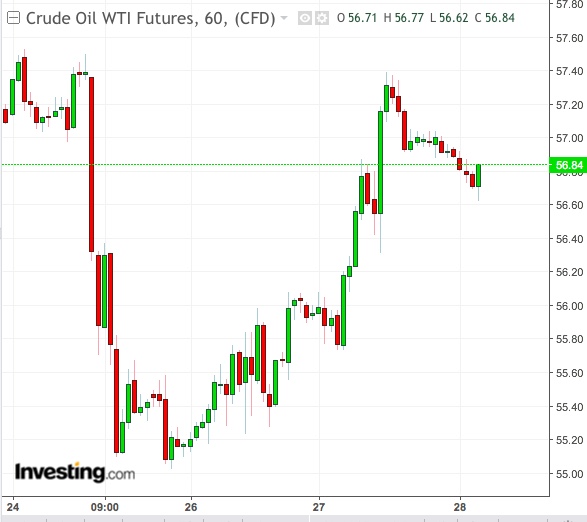In politics, timing is everything. The same could be said of markets, particularly that of oil now.

Crude oil prices jumped as much as 3% on Wednesday after the U.S. Energy Information Administration surprised the market by reporting that crude stockpiles fell by nearly 9 million barrels across the country last week, versus analysts’ estimates for a build of nearly 3 million barrels.
But even before the EIA report, the market had been rising for another reason: defiance by the OPEC+ alliance of 25 oil producing countries of a tweet by U.S. President Donald Trump from Monday that called on the group to “take it easy” with its production cuts, which he said were driving crude prices “too high.”
Khalid al-Falih, energy minister of Saudi Arabia, the kingpin of OPEC, had the perfect wry response for that tweet on Wednesday, telling CNBC:
"We are taking it easy. We listen to the honorable president, and hear his concern about consumers and assure everybody, whether it's him or developing country leaders, that we are as focused on the interests of the global economy and consumers around the world, as we are focused on the interests of producers.”
For good measure, the Saudi official added that the 25 countries in OPEC+ were taking “a very slow and measured approach” with production cuts, and their interest was in “market stability, first and foremost".
U.S. President Bogged Down By Cohen Testimony, North Korea
Trump, halfway across the world in Hanoi at a summit with North Korean leader Kim Jong-un, did not tweet a response to Falih but fired off one on Pyongyang and his hopes for de-nuclearization. The White House, however, said on Thursday the summit had been cut short and there would be no pact signed.
The U.S. president also tweeted about something else on Wednesday that deeply bothered him: accusations by his former lawyer Michael Cohen that he lied about his Russian business interests during his 2016 campaign, about stolen Democratic emails that hurt his rival Hilary Clinton and about illegal hush payments to cover up alleged sexual indiscretions.
With worries over the Cohen testimonies, North Korea and difficulties in reaching a trade deal with China absorbing him, Trump is not expected to pay too much attention to OPEC and the oil market for now.
It would be a situation identical to late December when, caught up with an impending U.S. government shutdown that ultimately lasted over a month, Trump suddenly abandoned his campaign for low oil prices that helped trigger the market’s 40% crash during the fourth quarter.
No Oil Tweets Will Help OPEC Continue With Its Narrative
With the president not tweeting about oil anymore—partly because he already got the low price relief he wanted for the U.S. midterm elections in November—Saudi- and Russia-led OPEC+ managed to control the market’s narrative, resulting in a 35% jump in crude prices since from Christmas Eve lows.
Having Trump away from the market again would arguably be a relief to Falih and other OPEC officials, given that the president’s tweets on oil do temper the market’s bullish fervor each time, even if just for a day.
Meanwhile, there are mixed views on how high prices and demand for oil could get in 2019.
Wall Street’s most influential energy forecaster Goldman Sachs said last week crude could peak at between $70 and $75 per barrel in the coming months, then slump to $60 in the second half, partly due to the relentless surge in U.S. output, which was already at a world record of 12 million barrels per day and could reach 13 million bpd before end-2020.
Trump Options Versus Saudi Determination
There is also much debate on what else the U.S. president, or congressmen acting on his behalf, could do to get lower oil prices.
One would be using the No Oil Producing and Exporting Cartels Act (NOPEC), approved by a U.S. Congressional panel on Feb. 7, to bring anti-trust action and sanctions against any country engaging in OPEC-type supply pacts.
Trump could also try and flood the U.S. physical oil market with supply from the government’s Strategic Petroleum Reserve, which holds about 730 million barrels in all.
But with the Saudis determined to cut as much of their own production as necessary to get the market back to $80 per barrel, a level that global benchmark Brent last saw in October, analysts think Trump will have a real fight on his hands.
Falih said on Wednesday his analysis showed OPEC+ may have to extend its output cuts till the end of the year to balance the market. The alliance is to meet again in April to decide further action.
Said the Saudi energy minister:
"The current levels are not God-given, this is just the best compromise we could reach back in December.”
"So if in June we find out we need to have a different limit, a different target from 1.2 million (barrels), certainly it is open. But the easiest way forward, assuming it is still an oversupply, would be to roll over."
With such fundamentals, Trump’s words or actions may matter a lot less this time, argued Dominick Chirichella, director of risk and trading at the Energy Management Institute in New York and a 40-year veteran of energy markets.
Said Chirichella:
“It is going to take more than a few tweets from President Trump to derail the uptrend in oil prices that have been in play since the end of December.”
